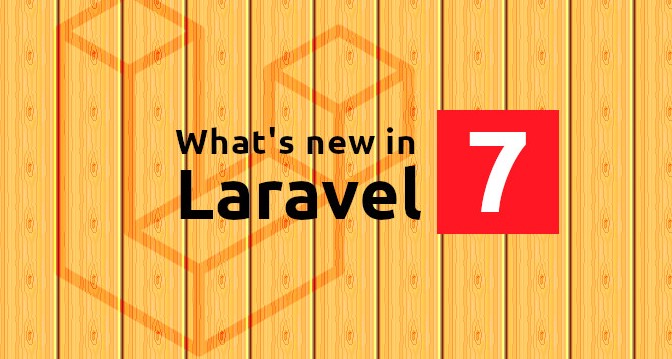The wait is now over. Laravel 7 is now released on March 3, 2020. It involves many new features and updates as compared to Laravel 6. It is one of the most significant updates by Laravel. It has fixed the bugs. Learn more about this best PHP framework by reading eloquent Laravel interview questions.
In this article, we would explain all the additions that have been done in the latest PHP framework. Let us now have a look at the new features of Laravel 7.0-
There are high impact changes and medium impact changes brought in Laravel 7.0 as compared to the previous versions.
High Impact Changes:
- Authentication Scaffolding
- Date Serialization
- Symfony 5
- 1. Authentication Scaffolding: You need to install 2.0 release of Laravel Authentication Scaffolding as they are moved to the Laravel/ui repository.
- Date Serialization: Now the framework for Laravel appear in the format like 2019-12-02T20:02:00.283041Z. Earlier the serialized dates appear like 2019-12-02 20:01:00.
- 3. Symfony 5: Alike the previous versions of Laravel, the 7th version uses 5.X series of the Symfony components. In order to upgrade to the advancements in Laravel 7.0, the user have to make certain changes.
Medium Impact Changes:
- Laravel Airlock
- Custom Eloquent Casts
- Blade Component Tags & Improvements
- HTTP Client
- Route Caching Speed Improvements
- Fluent String Manipulation
- CORS Support
- Customisable Stubs
- Query Time Casts
- Numerous Mail Driver
- Laravel Airlock: This additional feature provides a featherweight authentication system for token-based APIs, mobile applications and all other single-page applications. This feature helps the user to generate more than one API tokens for their account. The tokens would specify the actions that can be performed. It is also known as Laravel Sanctum.
- Custom Eloquent Casts: These are contributed by Taylor Otwell. There are multiple cast types of built-in Laravel. So, you need to specifically define the cast type to implement the function. This has been made easier with the introduction of CastsAttributes interface. The classes must define a get and set method. The former method transforms a raw value from the database into a cast value. On the other hand, the set method does the opposite-transform a casting value into a raw value. Such a value can be stored in the database. For example, a re-implementation of the built-in JSON cast type would be required in the form of a custom cast type.
- Blade Component Tags & Improvements: Now these have been revised to allow attribute management, tag-based rendering, component classes, inline view components, and a lot more. In simpler words, a component would now have an associated class that accepts a particular form of data. The component class has public properties and methods which are there in the component view. All the HTML attributes can be managed on the component with the help of automatically included $attributes variable. These are then termed as attribute bag instance.
- HTTP Client: In Laravel 7.0, there are minimal and expressive API around Guzzle HTTP client. It is beneficial because it has made outgoing HTTP requests very quickly. Now the communication with other web applications would take lesser time. There are various advantages related- nice developer experience and common use cases.
- Route Caching Speed Improvements: A new method has been introduced to match compiled and cached routes cached using route: cache Artisan command. The benefits? Doubled speed. Now even the simplest programs would run with double speed. No changes are required to be made to the applications.
- Fluent String Manipulation: There is a new stringable class in Laravel 7.0. The class provides a fluent object-oriented interface available for manipulating strings.
- CORS Support: It is Cross-Origin Resource Sharing (CORS) Support contributed by Barry vd. Heuvel. Now the latest update in this PHP framework can automatically respond to CORS OPTION requests with the help of the values you have configured. The settings of CORS can be configured in CORS configuration file. HandleCors middleware will automatically handle the OPTIONS requests.
- Customisable Stubs: In order to customize the stub files, you need to run publish command.
Php artisan stub: publish
Running this command will help you to add a new directory in the project, making the project implementation easy for you.
- Query Time Casts: Matt Barlow has contributed the query time casting feature in Laravel 7.0. While executing certain commands in the project, you need to apply casts in many forms. Like during the selection of a raw value from a table. One of the most efficient ways to apply a date cast.
- Numerous Mail Driver: Now you don’t need to spend time in individually sending mails. Laravel 7 has made it accessible to send multiple mailers for a single application. All the mailers are not required to be of same configuration. They might have their own options and unique transport. How is it beneficial? Now your application can send certain email messages using different email services.
Hope you have expanded your horizons of knowledge by learning about the newly added features of Laravel 7.0. You can further deepen your knowledge base by reading the best Laravel 5 interview questions from our platform. We keep our readers up to date with the updated content and versions. Learn more, know more to beat the fierce competition.
Share your thoughts about the article, we love to hear from our readers.
Thanks for your time.

